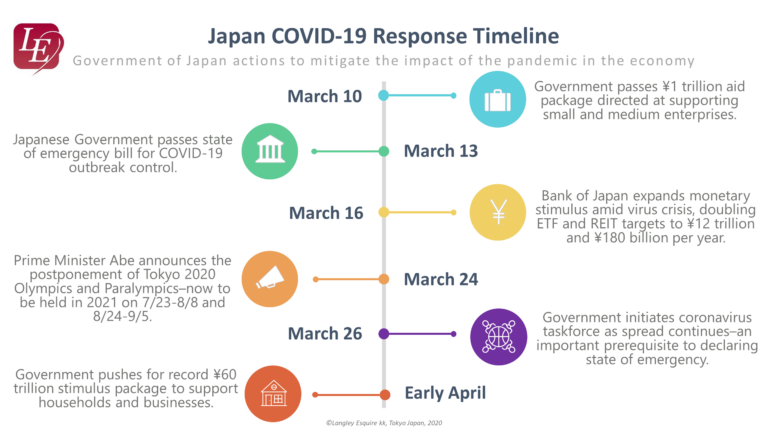
April 1, 2020
With the 201st regular Diet session we will continue to see major developments focused on policy to address the COVID-19 pandemic. A key focus will be the Government of Japan’s attempt to offset the negative effects on the global economy. Immediate response of the government includes stimulus packages to support households and enterprises, an emergency bill granting greater powers to prefectural governors, and an extraordinary budget to further assist the nation. The Olympics have now been officially postponed, as well as a number of diplomatic missions scheduled to occur this month (i.e. visit by PRC President Xi Jinping).
Despite all the commotion, we have also seen other regulatory developments in the Diet: an expanded role for the National Security Council (NSC); revisions to the Copyright Law and Act on the Protection of Personal Information, and the Ministry of Agriculture, Forestry, and Fisheries (MAFF) releasing its 10-year basic policy draft.
This month’s edition of Policy Radar focuses on policy developments as a result of COVID-19, Data, Cryptocurrency, Finance, and Agriculture.
COVID-19 Government of Japan Response

Government passes ¥1 trillion aid package for small and medium enterprises
The Japanese Government adopted a new ¥1 trillion emergency package on March 10th to assist small and medium sized enterprises, as well as self-employed workers, impacted by the COVID-19 outbreak. This new package triples the initial financial aid package of ¥500 billion introduced in February, to a total of ¥1.6 trillion. The package consists of low interest loans to SMEs facing shortage of liquidity. To qualify for a zero-interest loan, a business must be facing a sales decline of at least 15-20%, compared with last year’s numbers. Companies and individual business operators facing a sales decrease of 5-14% can apply for loans with an interest-rate of less than 1%. Major Japanese companies will be assisted by the Japan Bank for International Cooperation and the Development Bank of Japan.
To help businesses combat the pandemic’s effect on the world’s supply chain, the government will also assist firms investing in equipment and facilities that support teleworking. The Ministry of Health, Labour, and Welfare will also grant income compensation subsidies of ¥8,330 per day to companies whose full-time and non-regular employees take leave (to care for their children) from February 27th to March 31st— funds will not be extended to parents taking leave whose children go to junior-high or above. It will provide subsidies of ¥4,100 a day to freelance workers obligated to take care of their children at home due to school closures.
Despite this, the government has urged schools to offer ad-hoc child care services and has lifted nationwide school closures for the April term. The government has also included provisions for the purchase of face masks to be used in hospitals and public medical facilities. As part of an extraordinary budget (mentioned below) to be passed this month, the government plans to hand out cash for the Tourism and Food & Beverage industries as well.
Japanese Government passes state of emergency bill
The Japanese Diet approved a bill authorising the Prime Minister to declare a state of emergency, if needed. Under the new state of emergency framework, prefectural governors have ample powers to restrict usage of schools, department stores, movie theatres, and any public space. This bill also grants the power to governors to request private businesses the use of their office spaces for temporary medical facilities. Additionally, companies can be required to maintain stock of products deemed “essential,” as well as get their medical and food products requisitioned by the prefectural government.
Governors will additionally be allowed to order people to stay home, except when commuting to work, seeking medical treatment, and shopping essentials. The bill was passed with the votes from the ruling coalition, the LDP, and Komeito, with votes from the two largest opposition parties, the CDPJ and the DPP. However, the Prime Minister has repeatedly insisted that measures contemplated under the bill will only be used in a “worst-case scenario,” determined by a panel of infectious disease experts and the Cabinet. On Tuesday, March 31, Tokyo Govenor Koike Yuriko urged Prime Minister Abe to decide if the central government should declare a state of emergency.
BOJ expands monetary stimulus amid virus crisis
In an emergency one-day meeting on Monday, March 16, The Bank of Japan (BOJ) decided to expand its monetary stimulus, to join other nations’ banks efforts to curb the effects of COVID-19 on the economy. The bank expanded its purchase of stocks, corporate commercial papers, and corporate bonds, along with its loan support program for businesses to address the lack of liquidity in the market. The upper-limit of annual purchases of exchange traded funds (ETFs) and of real-estate investment trusts (REITs) was doubled to ¥12 trillion and ¥180 billion per year, respectively. Additionally, corporate bonds and commercial paper balance upper-limits were increased to ¥4.2 trillion and ¥3.2 trillion, respectively.
The BOJ also announced that it will start a new loan program directed at commercial banks, allowing them to obtain one-year loans in exchange for corporate collateral. The bank will not alter interest-rates and its holdings of the government’s debt, despite initial concerns that it would dive deeper into negative interest-rates. The BOJ’s Governor, Haruhiko Kuroda, has assured that further steps would be taken when “there is additional pressure on the economy and inflation grows.” Furthermore, the BOJ made an emergency purchase of ¥1.3 trillion in government bonds in a bid to curb the increasing long-term yields.
Prime Minister announces postponement of 2020 Tokyo Olympics
On March 24th, the Prime Minister announced that Japan and the International Olympic Committee (IOC) had reached an agreement to postpone the summer Tokyo Olympics and Paralympics until next year, due to the rapid spread of COVID-19. On March 30th, Tokyo Governor Yuriko Koike announced that the Olympics would be held from July 23-August 8 and the Paralympics on August 24-September 5, in 2021.
Despite this, Governor Koike confirmed that the Tokyo Olympics will still be called “Tokyo 2020.” The Governor reiterated that she was happy that a cancellation did not materialize, though it is predicted that the postponement will incur vast financial losses for the country, the IOC, and its stakeholders. More details concerning the process leading up to the Olympics next year (i.e. roadmap, schedule, construction of venues, etc.) will be decided by relevant authorities and the IOC Executive Board in the coming weeks. Tokyo 2020 CEO, Muto Toshiro, remarked that the biggest challenges lying ahead will be costs and venue occupancies.
Japanese Government sets up task force to combat recent spike in COVID-19 outbreaks
On Wednesday, March 25th, Yuriko Koike, Governor of Tokyo, urged for social distancing and the refraining of non-essential outings over the weekend and through to April 12. The Japanese government, through the Minister of State for Economic and Fiscal Policy, Nishimura Yasutoshi, set up a special task force in response to the recent surge in coronavirus on Thursday, March 26th. Health care officials from a government panel on infectious diseases fear we are heading towards an “explosive trend” in cases. Before the state of emergency is called, an important legal prerequisite is to have the special task force already established. Each prefecture will then be able to establish their own task force, which the government can then use to instill further measures to curb the pandemic whilst cooperating with local governments — the Tokyo Metropolitan Government followed suit and has initiated its own task force on Friday, March 27th.
Government readies largest stimulus package to-date
The ruling coalition and opposition parties, as well as government representatives have met to discuss utilizing a record-breaking stimulus package to combat the economic and financial consequences caused by COVID-19. The priority of the parties has been placed on securing low-income families to meet their needs, providing medical equipment for hospitals, and encouraging research and testing against the virus. Specifics are still being discussed, but the government wants to have the aid package ready by early April. The Policy Research Council of the LDP will submit its recommendations to the government directly.
As of March 31st, the LDP is pushing for a ¥60 trillion stimulus package, exceeding the ¥56.8 trillion package put together following the global economic crisis in 2008. The package would include subsidies for SMEs and freelancers, and cash handouts to households. The Komeito is pushing for direct government-assistance to households through cash and vouchers, as well as subsidies to businesses to keep the unemployment rate stable. Opposition parties are urging the government to include tax and spending breaks, but there is disarray between the CDPJ and the DPP with regard to lowering the consumption tax from 10% to 5% and handing each citizen ¥100,000. However, government officials are closer to the 2009 aid package which included a handout of ¥12,000 to all Japanese citizens, but it is not clear whether the cash handout will only be given to everyone or to child-rearing families and low-income families. Another possibility includes giving ¥200,000 to ¥300,000 to eligible households (approximately 10 million households) in May. The government wants to pass this stimulus package in early April as an extraordinary budget, to not be included in the fiscal 2020 ordinary budget.

Data
Cabinet approves bill revision to online copyright law
The Cabinet approved a bill amending the Copyright Law to expand the number of online platforms and products it applies to. Currently, the anti-online piracy section of the law only applies to music, videos, and movies. Under the new government-proposal, manga, magazines, and academic texts will also be included. Additionally, whether one illicitly downloads copyrighted content or accesses it online, the same criminal charges and fines may apply. There will be some exceptions that will allow and not prosecute the download of copyrighted material under “minor offenses” (e.g. posting a single frame of a 10 page+ manga or work) and “special instances.” Offenders could be charged with two years imprisonment and a maximum fine of ¥2 million. The government aims to see the revised law pass parliamentary ratification during this Diet regular session.
The government has previously approved a law that will start to be enforced from October, punishing websites that reference or give access to links that contain illegal content. Technology Minister, Hagiuda Koichi has expressed that the law reflects a careful balance between respecting copyrighted material and people’s efforts to collect information.
Government adopts bill improving personal data security
After months of technical revisions, the government has adopted a bill to review the Act on the Protection of Personal Information that would require companies to obtain consent of their users if they share personal data with third-parties. The future law would make it easier for users to demand that companies refrain from using their personal data when their rights and interests are at risk.
The law would encourage replacing names in data sets with pseudonyms to limit personal information exposure. Failure to abide by warnings issued by the Personal Information Protection Commission will incur higher fines of up to ¥100 million (from the current ¥300,000). This will not apply to internal data use within companies for research and development purposes.

Agriculture
MAFF maintains 45% calorie-based food self-sufficiency rate for 2030
The Ministry of Agriculture, Forestry, and Fisheries (MAFF) decided to extend its 2025 target to increase Japan’s calorie-based food self-sufficiency rate of 45% until 2030. The ministry has also established a goal to increase the country’s self-sufficiency rate based on output value by 9% to reach 75% in 2030. These goals are part of a draft basic policy of the ministry for the next 10 years.
The policy aims to increase the value of food exports five-fold to ¥5 trillion in the next ten years, which, according to the ministry, would help raise the nation’s self-sufficiency rate due to an expected rise in domestic production. The draft basic plan also encompasses tools to encourage both large- and small-scale farming, to increase the country’s supply of food, which then can be exported overseas. The 10-year basic policies are assessed and reviewed every 5 years.

Cryptocurrencies
LDP lawmakers pressure government, BOJ to issue digital yen
Ranks of the LDP are pressuring the Bank of Japan (BOJ) to issue a digital currency by submitting a formal request to the Ministry of Finance (MOF). Seeing the cautious stance of the BOJ, which is now part of a joint-research platform on digital currencies with other countries’ banks, they hope that the government will start the process of creating a digital yen. Legislators from the LDP worry that China’s digital yuan and the country’s rapid penetration of financial systems in developing nations may set a new international standard for digital currency technology and payments. The lower ranks of the LDP are also concerned that data flows to China could increase, leading to heightened security risks. The Deputy Prime Minister and Finance Minister, Aso Taro responded by saying that the government needed to be calm about digital currency issues and carefully study the digital yuan first. He is said to prefer a coordinated approach with other countries, rather than going forward without parallel efforts from other central banks.
Besides this initiative, the LDP’s Research Commission on the Finance and Banking Systems is also targeting the creation of a digital currency by the BOJ. While the BOJ may prefer to continue researching the effects of digital currencies on the global economy at its own pace, this mounting political pressure forces greater consideration of a central bank-issued digital currency. At the same time, however, the national bank also worries about the effects of a national digital currency, as it could potentially stifle private businesses and discourage innovation.
FSA announces launch of global blockchain governance council
The Financial Services Agency (FSA) launched the Blockchain Governance Initiative Network (BGIN) on March 10, 2020. This new global network will act as an international body to guide the sustainable development of blockchain technology and on governance of decentralized finance. This new initiative seeks to play a leading role in improving open dialogue and regulatory controls for blockchain technologies. Toshihide Endo, Commissioner of the Japan Financial Services Agency says this organization will address anti-money laundering controls and work to prevent the likes of ICO scams, hacks at cryptocurrency exchanges, and regulation concerning Security Token Offerings.

Finance
National Security Council to further expand its oversight
The government has expanded Japan’s National Security Council (NSC) prerogatives to monitor large economic threats in the changing global economic and financial environment. This would allow the NSC to monitor effects of the COVID-19 pandemic on the domestic economy. The council has also signaled other areas which will be studied, such as digital currencies, land acquisitions by foreigners, and intellectual property.
The economic section of the National Security Secretariat will be launched in mid-April and will work with other ministries and agencies to craft a coordinated future economic strategy. The council, along with the MOF and FSA, plans to track the development of digital currencies and work with U.S. authorities on digital transactions. The broadening of the NSC’s mandate parallels the government’s ongoing debate to expand national security measures to include 5G networks and other new technologies.
As the outbreak of the COVID-19 pandemic continues to bring unprecedented impact around the world, public and private sectors rush to adapt to a rapidly-changing global environment. While there is uncertainty for what lies ahead, new opportunities emerge for business and government partnerships. Every day brings new insights, opportunities, and technology that affect Japanese politics, business, and society.
If you are struggling to bridge the gap between now and what lies ahead in your government affairs strategy, contact us to learn more about what we can accomplish for you.
